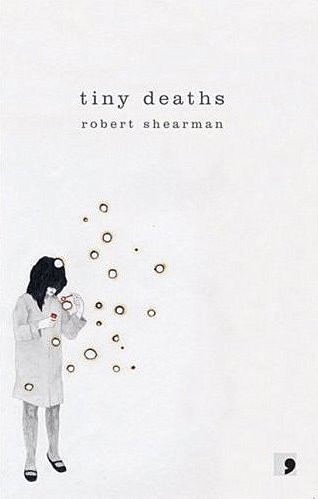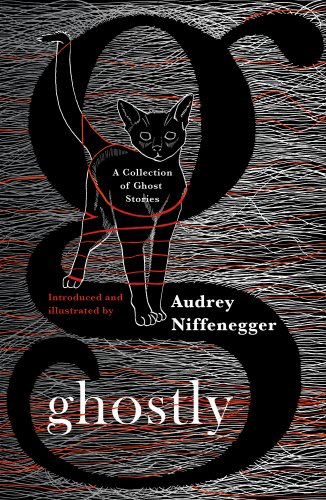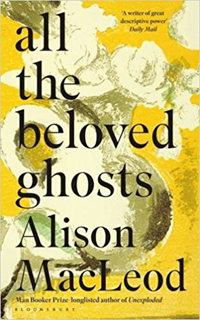
‘Glamour Goat‘ © marjanadana, 2016
WHAT I FEEL WHEN I TALK ABOUT SHORT STORIES
by TRACY FELLS
When you read a short story that thwacks an emotional punch or haunts your daydreams then you have to talk about it. I read at least one short story daily, so what prompts me to talk about specific pieces? Emotional resonance. If the story triggered a strong reaction then I want to share how it made me feel. I cry easily, but intentionally sad stories rarely affect me, possibly because, as a fiction writer, I recognise the tricks being played. It’s the outliers that are surprising: the stories that make me recoil uncomfortably, make me laugh out loud, or suddenly trigger an epiphany that makes me want to cry. Three disparate short stories by three very different writers – Robert Shearman, P. G. Wodehouse and Alison MacLeod – do all of the above and I MUST talk about them.
Robert Shearman is a well-known dramatist with credits including episodes of Doctor Who; I first discovered his short fiction in Tiny Deaths, when it was listed as recommended reading for a creative writing course I was taking. Shearman’s collection was a revelation. It gave me permission to go ‘weird’, to push boundaries, to experiment with humour and pathos, and to have fun with my writing. I could talk about numerous stories from this collection, but one has stayed with me for years: ‘Damned if You Don’t’. This  story makes me shiver and smile at the same time – an evil smile, I admit, as it appeals to my dark side. Woofie is a Dachshund; he shares a room in Hell with Martin. Woofie is loyal and loveable, and he soon becomes Martin’s best-friend. I know a gorgeous Dachshund called Bertie. He has velvet fur and a glossy kissable snout. Bertie’s ego, like many small dogs, is massive; there is a glint of world domination in his chocolate-brown eyes. Unfortunately, whenever I meet Bertie I hear Woofie’s voice in my head (yes, Woofie can talk) and no longer crave a slobbery kiss.
story makes me shiver and smile at the same time – an evil smile, I admit, as it appeals to my dark side. Woofie is a Dachshund; he shares a room in Hell with Martin. Woofie is loyal and loveable, and he soon becomes Martin’s best-friend. I know a gorgeous Dachshund called Bertie. He has velvet fur and a glossy kissable snout. Bertie’s ego, like many small dogs, is massive; there is a glint of world domination in his chocolate-brown eyes. Unfortunately, whenever I meet Bertie I hear Woofie’s voice in my head (yes, Woofie can talk) and no longer crave a slobbery kiss.
‘Damned if You Don’t’ is dialogue heavy, giving it pace and keeping you hooked, and we learn about the main characters from their conversations. Martin asks Woofie why he’s in Hell:
“And I’m here because I didn’t bite him. Frankly, I was damned right from the start…”
“So really,” said Martin, “it’s just guilt by association.”
“Yeah,” said Woofie. “When he told me to fetch a stick, I was just following orders.”
Martin loves Woofie, even knowing the Dachshund was Adolf Hitler’s childhood pet, but he still asks for a new room-mate.
Woofie looked so sad, with his big dog watery eyes boring into him. Martin wished he’d be angry – bark at him, nip at his ankles, anything. Anything other than this quiet and this hurt.
At last Woofie said, “Is it because of the whole Hitler thing?”
“No,” Martin hastened to reassure him. “It’s because you’re a dog.”
The final revelation is chilling. It makes me question why I laughed at Woofie and Martin and their peculiar friendship, but that is Shearman’s cunning plan. He wants you to feel ashamed. Ashamed to have felt anything but horror at Woofie the Dachshund and the revelation that he may have sown his master’s ideology. It’s a message, hidden in the comedy, to never be complacent when prejudice arises:
“If you’re going to be damned anyway, at least be damned for something impressive. I’d rather be damned for being Hitler’s dog than Goering’s. Do you understand?”
Shearman’s writing makes me smile and squirm simultaneously as I read. But P. G. Wodehouse has a different effect: his words don’t just make me smile, they make me laugh out loud. I have to confess that I didn’t ‘get’ the humour in the TV Jeeves and Wooster adaptations, so there was no incentive for me to try Wodehouse’s short stories. However, my secret pleasure is ghost stories, and last Christmas I treated myself to several new anthologies, including Ghostly, which contains ‘Honeysuckle Cottage’ by P. G. Wodehouse. The foreword for this story claims, ‘according to his memoir, the philosopher Ludwig Wittgenstein thought ‘Honeysuckle Cottage’ was the funniest thing he had ever read’. Here was a challenge…
The opening line is an appropriate beginning for a spooky tale: ‘“Do you believe in ghosts?” asked Mr Mulliner abruptly.’ From the narrator’s reply we recognise this particular ghost story is going to be more tongue-in-cheek than heart-in-mouth.
“I don’t like them, if that’s what you mean. I was once butted by one as a child.”
“Ghosts. Not goats.”
“Oh, ghosts? Do I believe in ghosts?”
When I snorted out loud, my husband asked, “What’s so funny?” I read out the above and he laughed too. Mr Mulliner continues: “Do you believe in haunted houses? Do you believe that it is possible for a malign influence to envelop a place and work a spell on all who come within its radius?” And there is the entire premise of the story  laid bare on the first page. But the frivolity of the language intrigued me, and so I read on.
laid bare on the first page. But the frivolity of the language intrigued me, and so I read on.
The narrator, as in many ghost stories, is the impartial recipient of the tale and doesn’t actually feature in the story. He could be Wodehouse for all we know, as his identity is never revealed. The focus of the story is James Rodman, a typical Wodehousian protagonist: a confirmed bachelor. Rodman inherits Honeysuckle Cottage from his romantic novelist aunt, Leila J. Pinckney, who ‘wrote … nine million one hundred and forty thousand words of gluttonous sentimentality …’ Our chinless hero learns he has to ‘reside there for six months in every year. Failing to do this, he was to forfeit … five thousand pounds’.
The cottage is haunted by his aunt’s influence: ‘There’s a malignant spell over the place; a sort of miasma of sentimentalism. Everyone who enters it succumbs.’ We learn that Rodman writes detective novels, of which his aunt disapproved. Her legacy becomes her revenge. This is a tale of spiritual possession – I relished how Rodman’s stories become corrupted by the intrusion of soppiness – his work-in-progress along with his life are hijacked by a pretty girl who threatens to destroy his bachelor status. ‘Honeysuckle Cottage’ is a long short story, at just over thirty pages, and Wodehouse skillfully keeps the tone light and jolly throughout, making it feel much shorter. Even on re-reading I still smiled, laughed out loud at the obvious jokes and, consequently, I have to agree with Wittgenstein, this is the funniest thing I have ever read.
My emotional response to a story is rarely one that evokes tears, but I will shed a tear if the theme and execution hit a nerve. Alison MacLeod’s second collection, All the Beloved Ghosts, is packed with emotion. I started reading my copy on a train. Big mistake. I spent most of the journey pretending I wasn’t crying and surreptitiously wiping under my glasses.
In July last year I found myself in Singapore, with a delegation from the Commonwealth Writers, chatting with writing tutor, novelist and short story writer Jacob Ross. We shared something in common: a mutual love for MacLeod’s stories. I remember waving my hands a lot, talking excitedly about ‘The Heart of Denis Noble’, which I believe is one of the most perfect short stories you will ever read.
‘The Heart of Denis Noble’ first appeared in the Comma Press anthology Litmus: Short Stories from Modern Science and was adapted for broadcast on BBC Radio 4. The story is narrated from Noble’s third-person point-of-view, though occasionally drifts, dream-like, into an omniscient viewpoint. Fact: Denis Noble is alive today, he is a pioneer of Systems Biology who worked on mathematical models of the human heart. The story opens as Noble is about to undergo major surgery:
 As Denis Noble, Professor of Cardiovascular Physiology, succumbs to the opioids – a meandering river from the IV drip – he is informed his heart is on its way. In twenty, perhaps thirty minutes’ time, the Cessna air ambulance will land in the bright, crystalline light of December, on the small landing-strip behind the Radcliffe Hospital.
As Denis Noble, Professor of Cardiovascular Physiology, succumbs to the opioids – a meandering river from the IV drip – he is informed his heart is on its way. In twenty, perhaps thirty minutes’ time, the Cessna air ambulance will land in the bright, crystalline light of December, on the small landing-strip behind the Radcliffe Hospital.
MacLeod plays with time and reality, letting the narrative slip between key events in his life, as Noble fades in and out of consciousness. We join his mother, Ethel, right at the beginning when he’s still in her womb:
As she pierced the wool with her basting needle she remembered George’s tender, awkward kiss to her collarbone that morning, and, as if in reply, Denis’s heart, a mere tube at this point, beat its first of more than two billion utterances – da dum. Unknown to Ethel, she was twenty-one days pregnant.
The language is both lyrical and scientific, mirroring Noble’s personality. MacLeod describes how ‘Denis pins out the heart like a valentine’. He finds:
The buried trove, the day’s booty, is nestled at the core; next to the red flesh of the ventricle, the Purkinje network is a skein of delicate yellow fibres. They gleam like the bundles of pearl cotton his mother used to keep in her embroidery basket.
Moving through his youth we meet his student girlfriend, the love of his life, and learn of his daily visits to the slaughterhouse to collect sheep’s hearts, which led to an epiphany in his team’s cardiovascular research. Weaving the scenes together is Noble’s choice of ‘pre-op music – the second movement of Schubert’s Piano Trio in E-flat major’ and this, I’m certain, was the key MacLeod used to unlock the real heart (and soul) of Denis Noble.
On first reading, I believed this to be a true account of Noble’s life. MacLeod talked about the evolution of this story at a Writing Short Stories for Radio workshop I attended. She had spent time with Denis Noble and learned about his work, his life and his passions. But, to my surprise, she had made a brave creative decision to blur fact with fiction for this story. Of course, Noble never remembered being in his mother’s womb, but neither had he required a heart transplant. This is an uplifting short story, enthused with a man’s joy of existence, his love for science and the people who have journeyed with him, concluding with his childlike anticipation of the future. It celebrates a life and all life. That’s why I cried.
When I read short stories I read for my own enjoyment, enlightenment and entertainment, but also because I love the range of emotions that they can stir. Starting a new, unknown story can be thrilling, and a little bit scary, as you never know how the writer will make you feel. That is the joy of reading short stories. And that is why I love to talk about them.
~

Tracy Fells lives close to the South Downs in West Sussex. She has won awards for both fiction and drama. Her short stories have been published in online and print journals including Granta, Litro New York, The Nottingham Review, Spelk, Reflex Fiction, Firewords and Popshot. She has fiction published in anthologies such as Unthology 10 (Unthank Books), Rattle Tales and A Box of Stars Beneath the Bed (National Flash Fiction Day anthology). She won the 2017 Commonwealth Short Story Prize for Canada and Europe and has been shortlisted for the Fish, Bridport, Brighton and Willesden Herald Prizes. In 2016 she completed an MA in Creative Writing from Chichester University. Tracy tweets as @theliterarypig and is seeking a publisher for her short story collection.

